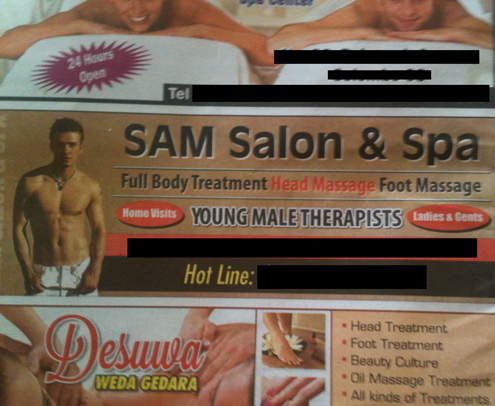Posted
by Kent Klindera, September 25, 2012
I
recently left Colombo, Sri Lanka, after spending three lovely days with
colleagues at Diversity
and Solidarity Trust (DAST). amfAR is supporting DAST to
work with the owners and staff at several male massage centers in Colombo,
which at times can act as fronts for male sex work. DAST has
proposed to assist the men in receiving formal massage therapy certificates, in
order to increase their likelihood of receiving more money for their massage services. During
my visit, they also discussed opening an English language class to assist the
masseurs in providing services to higher paying clients.
DAST is already promoting
safer sex, HIV testing and counseling, and social support for the men on a
regular basis. They are focusing on “test and treat” so that if someone is infected,
they can make sure they are on treatment, lowering the probably of spreading
HIV to others. I also met with a few masseurs who let me know they were
from rural areas, and that their income from massage work assists with their
studies, and supports family back home. They told me they “never” practice
penetrative sex in their work, but I was not convinced.

An advertisement for a male massage parlor working with DAST.
Unfortunately,
several massage centers have recently been raided due to various issues,
including illegal drug use. In an extreme case, some masseurs and clients
were arrested. As a result, some male masseurs have shifted to off-site
“house calls” for their effort, making it very challenging for DAST to
implement their program.
However,
a larger challenge for DAST is the infighting, back stabbing, and sabotage occurring
between various Sri Lankan LGBT-identified organizations. There are a several
other local organizations, which all seem to serve different populations
amongst the LGBT community—LGBT of higher means, LGBT youth, lesbian women,
openly identified gay men, transgender individuals, etc. However, to
international donors and networks, it seems that at times these groups and
individuals sabotage each other. Clearly, there is a history of corruption
among some individuals, as well as years of built-up mistrust. It seems very
self-defeating to me.
I
also had a long and fruitful conversation with colleagues representing various
UN agencies and The Family
Planning Association of Sri Lanka—all of whom were very supportive of DAST’s and
others’ work related to LGBT issues. However, they confirmed the infighting and
were not sure what to do about it.
As
many of us know, infighting like this is not unique to Sri Lanka. Such
infighting exists nearly everywhere and can be destructive. But as a
seasoned activist, I recognize that such infighting is natural, especially when
marginalized people are forced to fight over limited resources. However, as a
movement, we need to unite our efforts to challenge a homophobic and trans-phobic
world, and not allow internal conflicts slow our progress.
I
am honored to work with activists throughout the world and I have noticed that
activists in places under extreme threat seem to be more likely to work
together. In a way, having a crisis encourages more unity to defeat a
common opposition. For example, the LGBT activist movement in Jamaica has
had to deal with extreme violence against their community for years—both
physical and verbal (especially in the form of popular music). I’m not
sure exactly what the secret is, but, from my perspective, the Jamaican LGBT
organizations seem to be united.
Similarly,
I look to Uganda, where groups who once struggled through severe infighting
have come together to stand united against a religiously based, state-sponsored
assault on their livelihoods (even more notable after the death of David Kato—one
of their key leaders).
Back
to Sri Lanka—I also spent a lot of time chatting with a charming and peaceful
gay activist who is working on “peace-building.” Sri Lanka is emerging
from more than 25 years of civil strife. The government of Sri Lanka and
global human rights donors have responded to this situation by investing in
peace and reconciliation processes—working to build trust between ethnic
groups. During our conversations, a huge light bulb went on in both our
heads. We recognized that the work he was doing as a peace builder for the
nation is sorely needed within the LGBT community in Sri Lanka as well. I
left quite encouraged, as this activist seemed to be quite excited about
applying his skills to build peace in the LGBT community. Time will tell, but
I left with a whole lot of hope for this beautiful country.